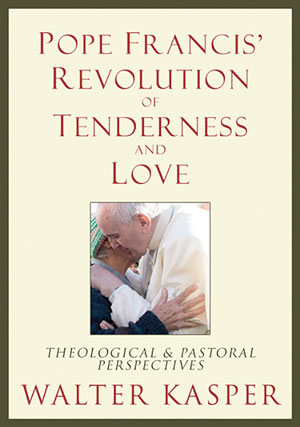Fifth in a series
 Though I think there are many exceptionally good sections of Cardinal Walter Kasper’s “Pope Francis’ Revolution of Tenderness and Love” (New York: Paulist Press, 2015, pp. 117, $16.95), I found Chapter Four illuminated for me my experience of contemporary culture and also the thought of some of the philosophers I teach at St. John’s University. The chapter’s title is “The Gospel: Origin, Foundation, and Source of Joy.”
Though I think there are many exceptionally good sections of Cardinal Walter Kasper’s “Pope Francis’ Revolution of Tenderness and Love” (New York: Paulist Press, 2015, pp. 117, $16.95), I found Chapter Four illuminated for me my experience of contemporary culture and also the thought of some of the philosophers I teach at St. John’s University. The chapter’s title is “The Gospel: Origin, Foundation, and Source of Joy.”
Noting that the reading of sacred Scripture and reflecting on it is essential for Pope Francis, Cardinal Kasper makes the point that for Pope Francis, the gospel does not mean a book or the four books that we call the Gospels. The cardinal comments that originally the word “gospel” means a message – the delivery of a good and liberating message – one that changes the situation. The “gospel” means a message that confronts the listener with a new situation and calls for him or her to make a decision. Cardinal Kasper writes the following:
“In the Old Testament, good news is the message of the imminent return of the people Israel from Babylonian captivity; in the New Testament, it is Jesus’ own message of the coming of God’s kingdom and the message of Jesus the Christ, of his death and his resurrection as the exalted Lord who is effectively present in the church and in the world through his Spirit; it is the message of hope for his final coming and of the dawn and gift of new life. So what matters to Francis is the good news of God, which is proclaimed, believed, celebrated, and lived in a spiritual way in the church. For him it is a gospel of joy in the sense of a holistic fulfillment of life that God alone, who is all in all, can give.” (pp. 23-24)
Every Aspect of Life
The word from Cardinal Kasper’s description of gospel as message in the Old Testament and in the New Testament that leaps out at me is “holistic.” My dictionary has the following description of “holistic”: “concerned with, or dealing with or integrated systems rather than with their parts.” The message from God is an integrated message, a message that covers every aspect of our lives. It is a message that should cause us a profound joy that can be retained, celebrated and deepened even in the presence of suffering and crosses.
I love the idea that Pope Francis is calling attention to the entire Christian message and to its liberating power. He is also, I believe, trying to help us see how the message can illuminate our experience. There is no aspect of life that cannot be illuminated by the Christian gospel.
Already in his pontificate Pope Francis has made very clear his concern for the poor and his zeal in teaching the Church’s doctrine of social justice. Cardinal Kasper points out that though the Holy Father is concerned about social justice, the contemporary problem to which the joy of the gospel speaks goes much deeper. The cardinal identifies the problem in this way:
“It concerns the lack of joy and the lack of spirit, the inner emptiness and the isolation of human persons closed up in themselves and the loneliness of hearts turned in on themselves. … Ultimately, his talk about the lack of joy and energy traces back to what, from the early desert fathers up to Thomas Aquinas, is regarded as the basic sin and original temptation of human beings: the acedia, the indolence of the heart, the gravitational pull dragging one down, the sluggishness, the weariness in spiritual matters that leads to the unhappiness of this world.” (p. 24)
Indicating that Pope Francis is not alone in his analysis of contemporary culture, the cardinal points out that similar analyses have been made by thinkers such as Soren Kierkegaard, the father of existentialism, and the great Catholic theologian, Romano Guardini. The cardinal also mentions Martin Heidegger’s insights into anxiety as our basic disposition, and Jean Paul Sartre’s focus on the ennui of the contemporary human person.
I agree with the Holy Father’s analysis of contemporary society and of the ennui that many are experiencing. Each person who professes belief in the gospel has the responsibility to be a witness to what he or she believes. I don’t think that this means we have to proselytize or preach. More important than preaching with words will be our experience of Christian joy. Allowing the gospel to cause a profound joy in our lives may be the best message we can give.
Father Robert Lauder, a priest of the Diocese of Brooklyn and philosophy professor at St. John’s University, Jamaica, writes a weekly column for the Catholic Press.

My comment turns on what may be an error by Cardinal K’s translator.
On p 24 Cardinal K suggests that many early authorities “regarded as the basic sin and original temptation of human beings: the acedia, the indolence of the heart, the gravitational pull dragging one down, the sluggishness, the weariness in spiritual matters that leads to the unhappiness of this world.” What he must mean, I think, is that the acedia, sluggishness etc is a consequence of the basic sin, which is a self-centeredness which limits or excludes concern for others from one’s life. Self-centeredness, not acedia, is the sin. This is clear if you read Evangelii Gaudium #s 1-2 and 81, which the Cardinal cites in this passage. Also note that the scripture citation which the Cardinal intends in his writing here is 2 Cor 7:10, not 1 Cor 7:10, a typo.